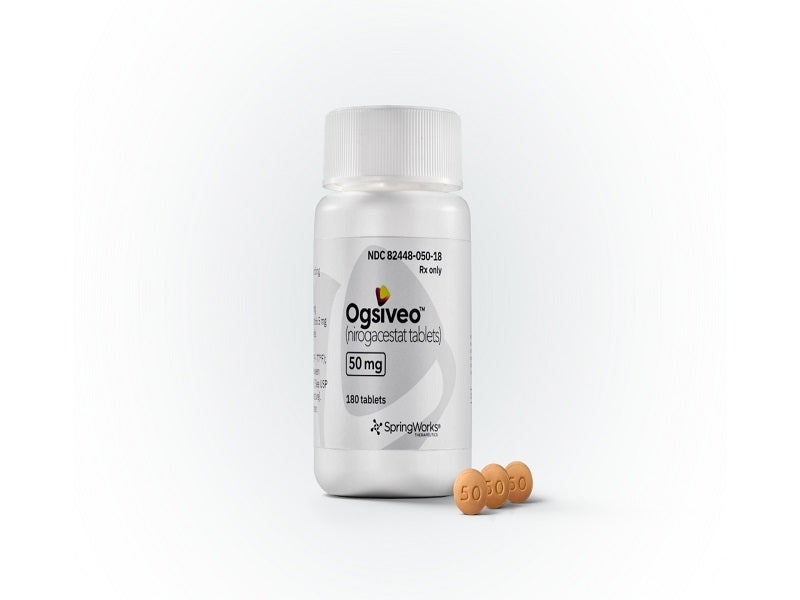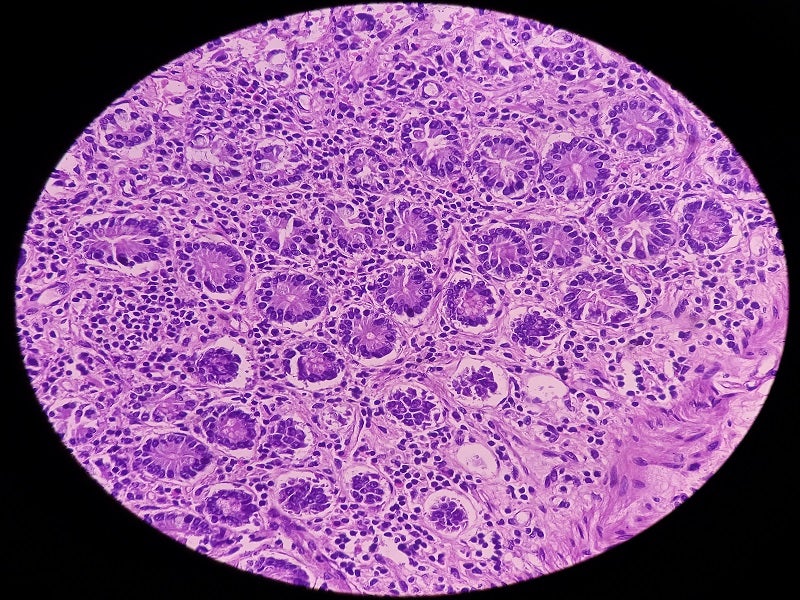Ogsiveo (nirogacestat) is the first and only treatment for adult patients with progressing desmoid tumours who need systemic therapy. Desmoid tumours are rare, aggressive, and locally invasive tumours of the soft tissues.
Developed by SpringWorks Therapeutics, a biopharmaceutical company based in the US, Ogsiveo is an oral, selective, small molecule gamma-secretase inhibitor available as a round, orange, film-coated tablet in 50mg dosage strength.
Regulatory approvals for Ogsiveo
Ogsiveo received approval from the US Food and Drug Administration (FDA) for the treatment of desmoid tumours in November 2023. SpringWorks is set to submit a marketing authorisation application for the drug to the European Medicines Agency during the first half of 2024.
The FDA granted priority review to the new drug application for the drug after reviewing it under its Real-Time Oncology Review programme, in February 2023.
Additionally, the drug has received orphan drug designation from the European Commission for treating soft tissue sarcoma. It also holds breakthrough therapy and fast-track designations from the FDA for treating adult patients with progressive, unresectable, recurrent, or refractory desmoid tumours or deep fibromatosis.
Desmoid tumour causes and symptoms
Desmoid tumours are noncancerous lumps, also known as aggressive fibromatosis or desmoid fibromatosis.
Most often they occur in the abdomen, arms, and legs. The tumours may invade the surrounding structures of soft tissues, causing pain, difficulty with movements, and decreased quality of life. In some cases, it can be serious and fatal if vital structures are affected.
The causes of desmoid tumours are not known. According to researchers, these tumours are caused when a connective tissue develops unusual changes in its DNA. The connective tissue cells multiply rapidly, forming tumours that destroy healthy tissues.
Desmoid tumours are mostly reported in patients aged between 20 years and 44 years, with a higher prevalence in females.
The most common symptoms include a lump or area of swelling, pain, loss of movement in the affected area, as well as cramping and nausea when desmoid tumours occur in the abdomen.
Between 1,000 and 1,650 new cases of desmoid tumours a year are reported in the US.
Ogsiveo’s mechanism of action
Ogsiveo inhibits the proteolytic activation of the Notch receptor. When Notch is improperly regulated, it has the potential to trigger pathways that support the growth of tumours.
Clinical trials on Ogsiveo
The FDA’s approval of Ogsiveo was based on data from the pivotal Phase III DeFi clinical trial.
DeFi is an international, multicentre, randomised, double-blind, placebo-controlled study to demonstrate the efficacy and safety of nirogacestat.
The study enrolled 142 patients with progressing desmoid tumours, who were randomised to receive either 150mg of nirogacestat or placebo. Progression-free survival (PFS) was the primary endpoint of the clinical trial.
The study demonstrated clinically meaningful and statistically significant improvement in PFS in patients treated with Ogsiveo.
The patients treated with Ogsiveo showed a 71% reduction in the risk of disease progression compared to the placebo group.
Additionally, Ogsiveo shrank tumours in 41% of patients with desmoid tumours, compared to 8% in patients treated with a placebo. The complete response rate was 7% in the Ogsiveo group and 0% in the placebo group.
Ogsiveo resulted in a median time to the initial response of 5.6 months, whereas the placebo group showed a median time of 11.1 months.
The drug exhibited early and sustained improvements in patient-reported outcomes, including pain, desmoid tumour-specific symptoms, physical functioning, and overall health-related quality of life. Ogsiveo also showed a good safety and tolerability profile.
The most common adverse effects reported in patients during the clinical trials were diarrhoea, ovarian toxicity, rash, fatigue, stomatitis, headache, abdominal pain, cough, nausea, alopecia, upper respiratory tract infection, and dyspnoea.





